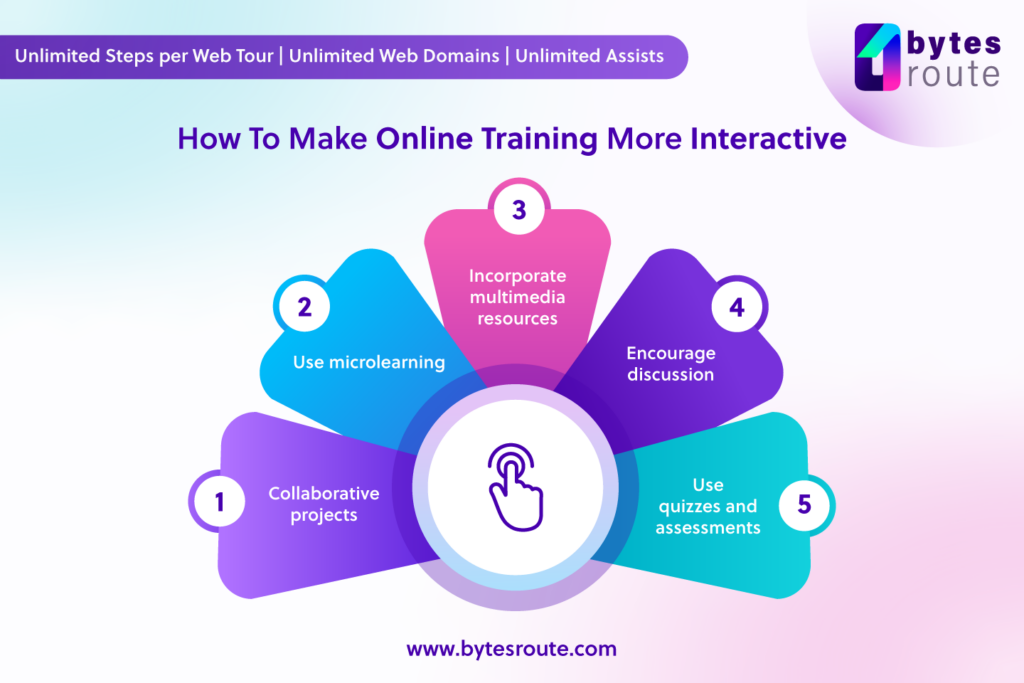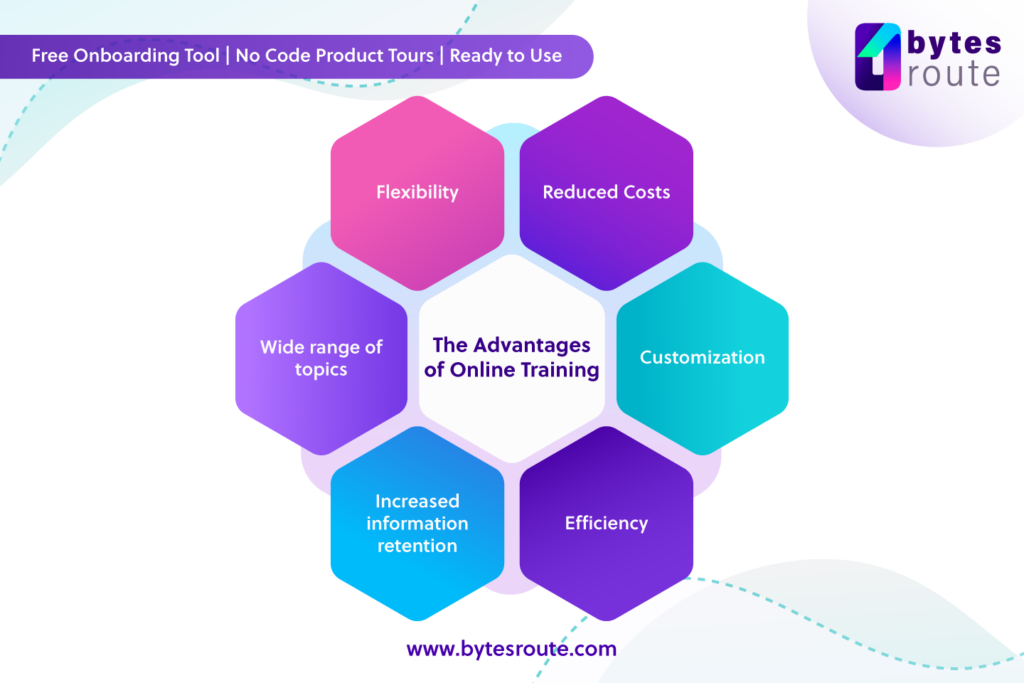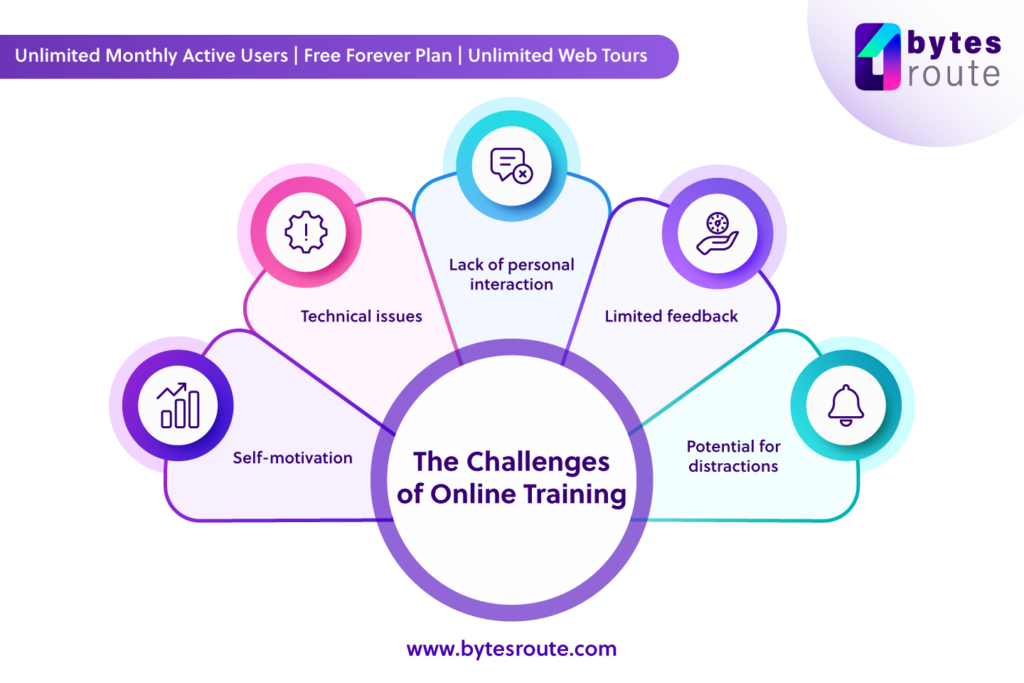What is Online Training?
Online training, also known as e-learning, is a mode of education that takes place over the internet. It involves using various digital tools and resources to deliver educational content to learners.
The range of what can be learned in an online classroom is vast, from industry-specific training to more general courses in self-improvement.
This learning style has become increasingly popular due to its adaptability, ease, and availability in improving the skills and productivity of individuals and businesses.
Online learners can participate in high-quality training from the convenience of their own homes or offices, at their own pace and time.
How do you make online training more interactive?

An important aspect of online training is maintaining the students’ interest and enthusiasm. That’s why it’s so important to embed interactivity into your training materials. Here are some ways to add greater engagement to your online training:
- Make your online training more interesting and interactive by incorporating multimedia resources such as videos, animations, and images.
- Facilitate social learning and cooperation by providing chances for engagement, such as discussion forums, live chats, or virtual classrooms.
- Make use of quizzes and assessments that can help learners reinforce their knowledge and skills and provide immediate feedback.
- Use microlearning which means learning by doing and breaking down complicated concepts or skills into smaller, more manageable bits. This can make the online learning more manageable and easier for students to engage with.
Why is online training important in the current digital age?
The capacity to gain new skills and knowledge in a convenient and economic way is a significant aspect of the digital age.
Being able to access courses from anywhere at any time makes it easy for busy individuals to integrate learning into their schedules. Also, the self-paced nature of online training allows learners to take the time they need to fully understand and apply new concepts.
Learners can tailor a curriculum to their specific requirements and interests thanks to the wide variety of options available. Interactive activities, videos, and assessments are just a few examples of online training materials that may be used to make learning more fun and successful.
Online education is a must-have for anyone looking to advance their education, learn new skills, and remain competitive in today’s dynamic job market.
The Advantages of Online Training

Online training, also known as e-learning, offers numerous advantages over traditional classroom training. Here are some of the key benefits of online training:
E-learning, or online training, has many advantages over more conventional educational formats. Several significant advantages of online instruction include:
- Flexibility: Learning can be more easily incorporated into hectic schedules because of the portability and accessibility of online training. This adaptability is especially helpful for those whose professional or familial commitments prevent them from attending the regularly scheduled classroom instruction.
- Reduced costs: Online training eliminates the need for travel expenses, course materials, and other associated costs, making it a more affordable option than traditional classroom training.
- Customization: Learners can tailor their training to their specific goals and interests by selecting from a wide variety of online courses and topics. Students may experience greater engagement and motivation as a result of these individualized choices.
- Efficiency: Online training can be completed more quickly than traditional classroom training, as learners can work at their own pace and focus on the areas they need to improve. This makes it an excellent option for people who need to learn new skills quickly.
- Increased information retention: There is evidence that shows that people retain more information when they are trained online compared to when they are trained in a classroom setting. This is most likely attributable to the utilization of interactive multimedia materials and the students’ opportunity to examine the course content as often as they see fit.
In summary, there are several advantages to online training for students, including more flexibility, personalization, effectiveness, and retention. It’s a convenient way to acquire new abilities and keep up with changes in your field, making it a good choice for individuals and businesses that are seeking to strengthen their training initiatives.
The Challenges of Online Training

While online training has numerous advantages, it also comes with its own set of challenges. Here are some of the main challenges associated with online training:
- Self-motivation: Students taking courses online should be very self-motivated and able to maintain a strict schedule. Some students may have trouble staying on track without the structure and accountability of a classroom setting.
- Technical issues: Online training relies on technology, and technical issues can cause frustration and disrupt learning. Poor internet connectivity or problems with the learning management system (LMS) can be particularly problematic.
- Lack of personal interaction: The interpersonal learning and connections that may be made in a classroom setting are missing from online education. Some students can miss out on getting their queries answered or interacting with their peers and teachers in real-time.
- Limited feedback: Feedback chances during online training may be limited, especially for more demanding abilities or tasks. Without a teacher’s direction, some students may be unable to pinpoint their weaknesses.
- Potential for distractions: Although convenient, the learner’s personal surroundings during online training might be a source of distraction. It’s possible that students will be tempted to do things like multitasking or taking frequent breaks that will interfere with their education.
Overall, online training requires learners to be self-motivated and disciplined, and technical issues, lack of personal interaction, limited feedback, and potential for distractions can pose challenges. However, with proper planning and implementation, these challenges can be minimized, and online training can be an effective and efficient way to improve skills and knowledge.
Strategies for Effective Online Training
Effective online training requires careful planning and implementation. Here are some strategies for ensuring that your online training program is effective:
- Set clear learning objectives: Identify the specific knowledge and skills that learners should be able to demonstrate at the end of the training program. This will help you design training materials that are relevant and focused.
- Use interactive and multimedia materials: Online training should be engaging and interactive to keep learners motivated and interested. Use a variety of multimedia materials, such as videos, animations, and interactive quizzes, to reinforce learning.
- Provide opportunities for feedback: Learners should have opportunities to receive feedback on their progress throughout the training program. This can be done through quizzes, assessments, or interactive simulations.
- Facilitate social learning: Online training should include opportunities for learners to interact with each other and the instructor. Discussion forums, live chats, and virtual classrooms can all facilitate social learning and collaboration.
- Provide ongoing support: Learners may need ongoing support throughout the training program. Make sure to provide access to additional resources, such as job aids or additional reading materials, to help learners apply what they have learned.
- Evaluate and improve: Regular evaluation and improvement are essential for ensuring that your online training program is effective. Collect feedback from learners and use it to make improvements to the training materials and delivery methods.
By using these strategies, you can design and implement an effective online training program that meets the needs of learners and helps them acquire new skills and knowledge.